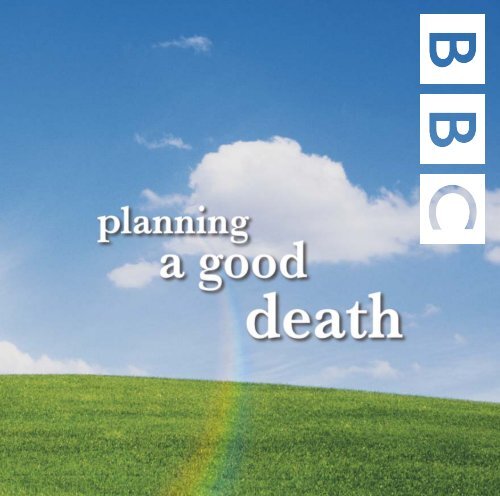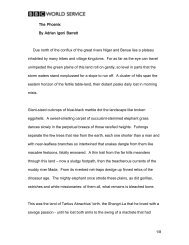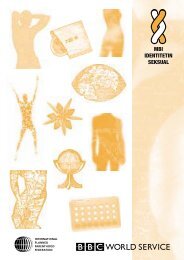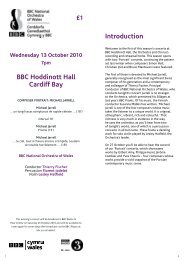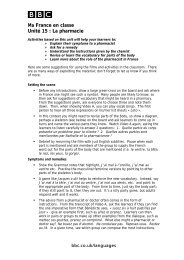Planning a Good Death booklet - BBC
Planning a Good Death booklet - BBC
Planning a Good Death booklet - BBC
You also want an ePaper? Increase the reach of your titles
YUMPU automatically turns print PDFs into web optimized ePapers that Google loves.
contents<br />
foreword 2<br />
practical<br />
Preparing for a good death 4<br />
Putting your affairs in order 8<br />
Writing a will 10<br />
Writing a living will 12<br />
Thinking about the children 16<br />
<strong>Planning</strong> a funeral 18<br />
emotional<br />
Making peace 20<br />
Talking about dying 24<br />
Asking doctors for all the facts 26<br />
Saying goodbye 28<br />
Being spiritual 30<br />
check list 32<br />
further information and advice 34
foreword<br />
by Esther Rantzen<br />
<strong>Death</strong> is often called the last taboo. For most of us, the thought of<br />
our own death or the death of someone we love is too painful to<br />
think about, talk about, or plan for. In any case, what’s the point, since<br />
nobody can foresee how, when or where they will die? Why don't we<br />
just leave the whole thing to accident or fate?<br />
There are good reasons to break the taboo and not only think about<br />
our death, but also discuss it with those closest to us, because there<br />
are important decisions we can make in advance. For example, we may<br />
have a clear idea about how we would like a funeral to be arranged. We<br />
might have views about whether we would prefer to die at home or in<br />
hospital. We would probably wish to have time to spend with family and<br />
friends and to say what needs to be said, and to have an assurance that<br />
our final hours will be pain-free and comfortable. We would probably<br />
also want to leave our affairs in good order, and be confident that our<br />
friends and family are left with good memories. We can try to talk about<br />
death and dying with our doctors and nurses, and find out about the<br />
different options for end-of-life treatment. So, tough as it may be to face<br />
the inevitability of our own death, it can be valuable and reassuring.<br />
There are, of course, no certainties ahead. No one can be guaranteed a<br />
good death. But following the suggestions in this <strong>booklet</strong> could increase<br />
our chances of dying as we would most wish, with privacy and dignity.<br />
The <strong>booklet</strong> describes some of the practical steps we can all take, and<br />
also looks at the emotional and spiritual aspects of our last days, the aim<br />
being to help us plan ahead.<br />
There are other advantages in breaking the silence surrounding death<br />
which are less tangible, but just as real. When I interviewed terminally ill<br />
patients and their families and carers for the <strong>BBC</strong> Two programme How<br />
to Have a <strong>Good</strong> <strong>Death</strong>, I realised how much they valued the opportunity<br />
to share each other’s thoughts and feelings at this most precious time.<br />
We hope reading this <strong>booklet</strong>, and using the blank pages for your own<br />
notes, will inspire you to have the same discussion with those closest to<br />
you. I have learned that no one can escape the pain of bereavement,<br />
but a good death can become the ultimate celebration of a good life.<br />
2 3
practical|preparing for a good death<br />
In a world where life-saving medical breakthroughs are often made and<br />
people can live for many years after a serious illness is diagnosed, it is<br />
easy to put off making important decisions about how we want to die,<br />
often until it is too late. A living will (see page 12) gives you the<br />
opportunity to influence your medical treatment at the end of your<br />
life. Just as important is a document or wish list that gives your family,<br />
friends and doctors detailed guidance on where and how you wish to<br />
live if you have a serious or terminal illness. You can write this wish list<br />
at any time in your life and update it whenever you want. Once<br />
written, though, it can provide vital information if you become unable<br />
to explain your wishes yourself – or it can simply provide reassurance,<br />
as you know that you have already made some decisions.<br />
Some things you may wish to decide:<br />
Where you think you would like to be cared for if you are dying<br />
(hospital, nursing home, hospice, at home).<br />
Whether you would want to know about the effects of any<br />
treatment (or non-treatment) you may be offered.<br />
Whether you would want to be told when you are close to death<br />
(assuming your doctors are able to predict this), and whether you<br />
want other people to know.<br />
Who should talk to any children, or other close family such as elderly<br />
parents, about your impending death if you are unable to do so.<br />
Who should look after your pets.<br />
How you want your final days to look and sound – what you<br />
would like in your room (flowers, pictures, radio, TV and so on).<br />
Who you would wish to visit you near the end.<br />
Do I understand what’s likely to happen to me as<br />
my life draws to a close and what support I might<br />
need? How do I find out more about my choices?<br />
?<br />
4 5
“My friend Viv was dying of cancer.We all knew<br />
it but her family insisted that it was never<br />
mentioned. It was dreadful to keep up the<br />
pretence but we couldn’t go against the family’s<br />
wishes. I was in the room when a reflexologist,<br />
who was giving her a treatment, asked if she<br />
was frightened of the future. I’ll always<br />
remember Viv nodding slowly, all the time<br />
looking into the therapist’s eyes.That evening,<br />
Viv told her sister that she wanted to be<br />
reconciled with her father whom she had not<br />
seen for many years, and a couple of days later<br />
he came and spent the whole day with her. She<br />
died later that week and I’ve always felt grateful<br />
to the reflexologist for doing so simply what<br />
none of us dared to do.<br />
Jackie, 35
6<br />
Your notes<br />
‘<br />
66% of people have<br />
never discussed death with<br />
’<br />
their loved one<br />
Taken from an ICM Research survey of 500 people for the<br />
<strong>BBC</strong> programme How to Have a <strong>Good</strong> <strong>Death</strong>, summer 2005
practical|putting your affairs in order<br />
This isn’t just about having tidy files – it’s also about leaving<br />
instructions on where everything is kept. This will save your family<br />
having to search through piles of papers to find the information they<br />
need, at a time of great stress. The instructions could include:<br />
details of your bank, building society, credit cards, pension, tax<br />
district and any other financial contacts<br />
telephone numbers and addresses of close (and distant) friends,<br />
family and colleagues<br />
where you keep documents such as your passport, house deeds,<br />
insurance, life and other policies, mortgage and hire purchase<br />
agreements, birth and marriage certificates, as well as items like car<br />
and house keys<br />
Age Concern has an eight-page form that you can use to note down this<br />
kind of information: ‘Instructions for my next-of-kin and executors upon<br />
my death’ (Information Sheet IS18 – see page 34 for contact details).<br />
How easy is it for my next of kin to find my<br />
important documents if I become ill or die<br />
suddenly? How can I make it easier?<br />
Your notes<br />
?<br />
8 9
“When my father got cancer, to ask him where<br />
he kept the deeds of the house would have<br />
seemed like an admission that he was going to<br />
die – and none of us ever acknowledged that as<br />
a possibility. Since his death six months ago, my<br />
mother has spent weeks trying to sort out his<br />
affairs.The deeds of the house haven’t turned up<br />
and his will is out of date.We can’t find the<br />
original copies of several insurance policies and<br />
investments – all of which are now being<br />
disputed and will eventually be paid only after<br />
substantial legal and banking fees.Towards the<br />
end, my father realised this was going to happen.<br />
He felt terribly guilty but was too ill to do<br />
anything about it.<br />
Matthew, 40
practical|writing a will<br />
Dying without leaving a will may cause problems for surviving relatives,<br />
often needing lawyers to sort them out. A do-it-yourself will form<br />
bought from a stationer’s or via the internet can be fine for<br />
straightforward situations, but bear in mind that a will is a technical and<br />
legal document and mistakes cannot be corrected after your death.<br />
The Law Society recommends that a will should be drawn up with<br />
face-to-face advice from a specialist solicitor who can point out the<br />
potential consequences of any bequest.<br />
Start by making a list of all your possessions and the people or<br />
charities you want to provide for, including any property you may wish<br />
to divide in a certain way. A will can name guardians for any<br />
dependent children and record your wish to leave money or property<br />
in trust for children or grandchildren. You could also write a letter of<br />
wishes to the children’s guardians or your heirs. Think, too, about<br />
arrangements for the care of pets or other responsibilities.<br />
If you don’t write a will, can you be sure that the<br />
people who are important to you will end up with<br />
a fair share of your savings and property?<br />
Your notes<br />
?<br />
10 11
practical|advance decision to refuse treatment<br />
Before you undergo medical treatment, you’ll be asked to give your<br />
consent. You can also let your doctors know your wishes in advance, in<br />
case you become physically or mentally incapable of telling them in person.<br />
If you're over 18, a document known as an Advance Decision to Refuse<br />
Treatment (ADRT) can specify treatment that you would wish to refuse<br />
always, or specify the circumstances in which this refusal would apply.<br />
An ADRT can be drawn up before an illness and still be valid and<br />
applicable if you become ill. It can also be the result of a discussion<br />
between doctor and patient, as long as the patient’s wishes are<br />
recorded in their medical notes or in an electronic record. You can<br />
nominate someone to speak to the doctor on your behalf if you’re<br />
incapable of doing so yourself.<br />
An ADRT is used most often to record a decision to refuse artificial life<br />
support, resuscitation or drugs such as antibiotics, even if this hastens<br />
death. It cannot be used to request treatment, including any form of<br />
euthanasia.<br />
An ADRT to refuse life-sustaining treatment has be in writing, signed<br />
(you can direct someone else to sign for you), witnessed and include a<br />
statement that the decision stands ‘even if life is at risk’.<br />
In thinking about making an ADRT, you may want to consider such<br />
questions as:<br />
What if I become too sick to eat except through a tube?<br />
What if I can’t talk or write or signal my thoughts?<br />
Ideally, your decisions should be known and understood by your<br />
GP, your next-of-kin and your wider family. Bear in mind that new<br />
treatments may be introduced in future that could affect your advance<br />
decision. Review your ADRT regularly to ensure it’s still an accurate<br />
reflection of your wishes. Organisations such as Age Concern, Dignity<br />
in Dying and the Natural <strong>Death</strong> Centre offer advice on advance<br />
decisions (see page 34 for contact details).<br />
Do I want to decide the medical treatment<br />
I’ll receive if I become unconscious or unable<br />
to communicate my wishes?<br />
?<br />
12 13
“I decided long ago that I didn’t want to be kept<br />
alive artificially if it meant I would survive<br />
without being able to walk and talk. My gran<br />
took ten terrible years to die from dementia<br />
and would have gone peacefully and with dignity<br />
if the doctors had withheld antibiotics when she<br />
had pneumonia early on. I’ve also seen how a<br />
living will can help people to live without fear in<br />
their final weeks. My father believed strongly<br />
that it was morally wrong to refuse life-saving<br />
treatment, and raising the subject provoked very<br />
heated discussions. Now, though, my parents<br />
have both written a living will and are happy that<br />
I have. Our trust of each other has deepened<br />
and I think we all feel easier about the future.<br />
Susan, palliative care nurse
14<br />
Your notes<br />
‘<br />
56% of patients have not<br />
discussed resuscitation with<br />
’<br />
medical staff<br />
Taken from an ICM Research survey of 500 people for the<br />
<strong>BBC</strong> programme How to Have a <strong>Good</strong> <strong>Death</strong>, summer 2005
practical|thinking about the children<br />
Hard as it is to think about, it is important to decide who you would<br />
like to look after your children if you die. Their other parent will often<br />
be the choice, but this may not always be possible or appropriate.<br />
Consider who you think would be able to offer love, warmth, stability,<br />
patience, continuing contact with friends and relatives, and the<br />
minimum of other changes to their life. Seek the agreement of your<br />
chosen guardian(s) and then write your wishes into your will. Think,<br />
too, about who you would like to tell your children that you are dying<br />
or have died, and make your wish known to those looking after you.<br />
Children and young people are often excluded from conversations<br />
about death by adults seeking to protect them. Yet they may have<br />
questions about what is happening and what will happen in the future,<br />
both to the person who is dying and also to them. What will happen<br />
at the funeral and can they be involved? Who will look after them<br />
afterwards? Make time to reassure children and answer their<br />
questions, and find out if there is a local childhood bereavement<br />
service that could help (some are listed on pages 34–38).<br />
Who would you want your children to grow up<br />
with if you were to die?<br />
Your notes<br />
?<br />
16 17
“Jane’s daughter, Ally, died of cancer. During her<br />
last few months of life her children lived with<br />
Jane, with whom they have always had a very<br />
close relationship.The children knew that their<br />
mum was dying and felt supported by Jane who<br />
always kept them informed of what was<br />
happening.They were able to go to their own<br />
schools and clubs and have friends home for tea.<br />
They all expected this to continue after Ally<br />
died.Their father, whom they hadn’t seen for<br />
eight years, appeared at the funeral and insisted<br />
on taking them home with him immediately<br />
afterwards.They are 230 miles away from Jane,<br />
their friends, their schools, their toys and<br />
precious belongings and – importantly – their<br />
dad won’t let them talk about their mother.
practical|planning a funeral<br />
Arranging a funeral is a hard thing to do but it can also be therapeutic,<br />
helping you come to terms with the death of someone who has been<br />
close to you. It can also be stressful, though, especially if you have no<br />
idea what they would have wanted for their final send-off.<br />
Have you thought about your own funeral – whether you would<br />
like to be buried or cremated, or where you would like to have your<br />
grave? Perhaps there is a place that is important to you, or somewhere<br />
your friends and relations would enjoy visiting. You could consider<br />
whether you want a religious service, what music you would like<br />
played and who should be invited. Or you might prefer one of the<br />
many non-religious services, celebrants and burial grounds, or a<br />
‘do-it-yourself ’ funeral. There are fewer regulations surrounding<br />
funerals and a much wider range of options than most people believe.<br />
While it may feel strange at first, some people find that planning their<br />
funeral when they are able to research the subject brings a feeling of<br />
relief and a freedom to get on with their life. Whatever you decide,<br />
make sure you share your wishes with those who need to know.<br />
Have I made plans for my funeral and shared them<br />
with family and friends?<br />
Your notes<br />
?<br />
18 19
emotional|making peace<br />
Many of us wish we had talked more to a parent, friend or colleague<br />
who has died, to have said “Thank you, you were so important” or<br />
“Don’t worry, it didn’t matter” – or to have heard the same from<br />
them. Sadly, important issues are often avoided when someone has a<br />
terminal illness, sometimes simply because it is too overwhelming<br />
even to start a conversation.<br />
With a potentially terminal illness, people are often encouraged to<br />
focus on the positive. There’s a feeling that a conversation triggered<br />
by the fear of dying can be a big turn-off. On the other hand, having<br />
people trying to be cheerful all the time can make it difficult to<br />
express what it feels like to be dying. Perhaps instead of them saying<br />
“You’re going to be fine”, you might want them to ask “Are there<br />
some things that worry you?” Instead of being told “We’re going to<br />
beat this”, you may want to hear “We’ll be here for you, whatever<br />
happens.” We may need to encourage friends and family to feel<br />
comfortable with this change of emphasis.<br />
However hard, it is also important to try not to be overcome by the<br />
intensity of the moment. Rather than saying “I just can’t talk about<br />
this”, try “I’m feeling a bit overwhelmed right now. Can we talk about<br />
this later tonight?”<br />
Even harder is trying to heal a rift with someone. Some quarrels<br />
may go too deep to be overcome, and dying people don’t suddenly<br />
change character. If it feels too difficult to do on your own, it may<br />
be worth seeking the help of a counsellor, chaplain or other<br />
professional. It is now recognised that unfinished business can cause<br />
physical as well as emotional pain that can linger for years.<br />
Could the prospect of dying help me to find the<br />
?<br />
time and patience to talk more to family and friends,<br />
or even end a long-standing quarrel?<br />
20 21
“Maxine Edgington was terminally ill with cancer<br />
when she joined a Rosetta Life project to<br />
co-write ‘We Laughed’ with singer Billy Bragg –<br />
and saw it get to number 11 in the charts in<br />
November 2005.The song was based on a<br />
photograph of Maxine and her 15-year-old<br />
daughter, taken shortly after she had been<br />
given six months to live.“I just wrote lots of<br />
things that had meaning to me and the<br />
experience somehow allowed me to release<br />
my innermost feelings. I realised that dying is<br />
not actually about me, it’s about those around<br />
me, their feelings, their needs, their ability to<br />
cope and their knowing that I love them. It’s<br />
about leaving nothing unsaid, preparing them<br />
for my departure but leaving happy memories<br />
of our last days together.”
22<br />
Your notes<br />
‘<br />
80% of people consider<br />
it important to talk about<br />
emotional as well<br />
’<br />
as<br />
physical needs<br />
Taken from an ICM Research survey of 500 people for the<br />
<strong>BBC</strong> programme How to Have a <strong>Good</strong> <strong>Death</strong>, summer 2005
emotional|talking about dying<br />
A ‘bad’ death might be defined as one where the dying person suffers a<br />
great deal of pain or other unpleasant, avoidable symptoms, or is<br />
prevented from being surrounded by their family. For all the health care<br />
funding spent on the last few weeks of life, many people suffer pain and<br />
loneliness while they are dying. Those who witness the bad death of a<br />
friend or relative often say they felt powerless to help. Doctors, too,<br />
may feel there is little they could have done.<br />
A bad death is not likely to be intentional. It is usually the consequence<br />
of a series of decisions taken by doctors, normally in consultation with<br />
relatives and often the patient – and in the case of life support, for<br />
instance, frequently made in an emergency.<br />
The way to have some influence is to find out the options for end-of-life<br />
care generally and the decisions that may have to be made during the<br />
final stages of a particular illness. Then comes the tricky bit: discussing<br />
your wishes frankly and in detail with your doctors, your family and, if<br />
there is one, the person you have nominated to represent your wishes.<br />
All of these people should support your choices.<br />
Have I made my wishes clear to my family and<br />
doctors so that those who have to make decisions<br />
on my behalf can do so with confidence?<br />
Your notes<br />
?<br />
24 25
emotional|asking doctors for all the facts<br />
Until recently, many doctors did not inform their patients when<br />
nothing more could be done to help them, believing that it was kindest<br />
to spare them the anguish of knowing they were dying. Today, things<br />
are different. The view is that people have a right to know everything<br />
their doctors know, that information can be a kind of medicine to<br />
patients as making decisions becomes part of the treatment. All the<br />
same, quite a number of doctors still withhold bad news unless the<br />
patient specifically asks to be told. Relatives, too, may often feel that<br />
this is for the best – for them it may be unbearable to have their loved<br />
one exposed to the knowledge that they are dying.<br />
Everyone is different. Some of us want this knowledge and others<br />
don’t, whether patient or relative. People may also change their mind<br />
about what they want during the course of an illness.<br />
If you have been diagnosed with a serious illness and want to be<br />
informed as fully as possible, you may need to make it clear not just<br />
that this is your wish, but also that you can bear to hear bad news.<br />
Would I want to know how serious my<br />
condition was?<br />
Your notes<br />
?<br />
26 27
“I’ve always been surprised by how reluctant<br />
patients’ relatives are to discuss the option of<br />
discontinuing active treatment. But then when<br />
my own father was dying of cancer, I had to tell<br />
the surgeon that we did not want him to have a<br />
further operation. I knew he had no chance of<br />
recovery, and he’d always said he didn’t want to<br />
go on living if he was disabled mentally or<br />
physically.Yet the conversation with the surgeon<br />
was one of the most difficult I’ve ever had.<br />
He obviously believed it was his duty to carry<br />
on as if my father had a chance of recovery.<br />
A part of me wanted to do the same, feeling<br />
that being realistic was betraying my father. I<br />
have never regretted the family’s decision –<br />
though I’m also much more sympathetic to<br />
relatives in that situation.<br />
John, 53, consultant physician
emotional|saying goodbye<br />
Collections of letters from deceased family members, old photographs<br />
and narratives about the lives of parents or grandparents are often our<br />
dearest possessions. Such mementoes may have come about<br />
accidentally, but you may wish to create something to leave behind for<br />
your family and friends.<br />
Something as simple as writing a letter to your family can help you stay<br />
connected to future generations. You might want to write about parts of<br />
your life that your family don’t know about or feelings you find it too<br />
difficult to express face to face. You could think about writing a personal<br />
history, or leaving a ‘memory box’ containing items that have a special<br />
meaning for you.<br />
These days, technology provides the opportunity to create other kinds<br />
of memories, such as audio recordings, videos and DVDs. Taking this a<br />
step further, many hospices organise creative workshops with artists,<br />
film-makers, poets, songwriters and musicians to help people to express<br />
their feelings and tell their story in order to complete their lives and<br />
prepare themselves to face what lies ahead.<br />
Would I like to create something to leave behind<br />
for my family and friends?<br />
Your notes<br />
?<br />
28 29
“<br />
“People ask me when is the right time to make<br />
a video. I always say now is the best time, not<br />
least because you will never again be as young<br />
as you are today,” says Josefine Speyer,<br />
psychotherapist and co-founder of the Natural<br />
<strong>Death</strong> Centre. Her husband, Nicholas, made a<br />
videotaped message in 1998, talking in a relaxed<br />
and humorous way about what was important in<br />
his life and passing on advice to his son and his<br />
friends. It was a half-hour exercise that proved<br />
”<br />
extraordinarily moving at his memorial three<br />
years later after his sudden death in a car crash.
emotional|being spiritual<br />
For many people, there is a spiritual aspect to approaching death that<br />
may be beyond religion. Questions such as “Why is this happening to<br />
me?”, “What was my life about?”, “Who am I?”and “What is going to<br />
happen next?” go to the limit of our understanding and our ultimate<br />
spiritual concerns.<br />
Such inner thoughts may be difficult to express. Yet there is evidence<br />
that many people with a terminal illness find it helpful and supportive<br />
to talk about spiritual concerns. Listening intently, even to jokes and<br />
throwaway lines, is the best way to engage in such conversation. Bear<br />
in mind, too, that there are different spiritual ‘languages’. For instance,<br />
a deeply religious person and a humanist may talk about things in quite<br />
different ways.<br />
Silence itself may be one of the best ways of communicating spiritual<br />
concerns, whether it is by sharing silent contemplation or meditation,<br />
or just being with someone, holding their hand and perhaps holding<br />
their gaze.<br />
How do I feel about spiritual matters and could I<br />
talk about them?<br />
Your notes<br />
?<br />
30 31
check list|practical<br />
I have:<br />
Recorded all my personal information so that it is clear<br />
and comprehensible<br />
Drawn up a legally binding will and had it checked by a solicitor<br />
Considered writing a living will<br />
Made arrangements for the future care of my children<br />
Written down or told someone where I would like to<br />
be cared for if I am terminally ill and what I would like to<br />
have around me<br />
Discussed ideas for my funeral with a friend or family member,<br />
or written them down and told a friend or family member where<br />
to find them<br />
check list|emotional<br />
32 33<br />
I have:<br />
Talked to friends and relatives about what dying means<br />
Agreed with family and friends what I want to know about a<br />
serious illness and what medical treatment I may wish to refuse<br />
Thought seriously about the people with whom I have<br />
unfinished business<br />
Talked to at least one of those people<br />
Begun recording the memories of my life that will be there<br />
when I am gone
further information and advice<br />
Age Concern<br />
Astral House, 1268 London Road,<br />
London SW16 4ER<br />
Tel: 0800 00 99 66<br />
Web: www.ageconcern.org.uk<br />
‘Instructions for my next-of-kin and<br />
executors upon my death’ (Information<br />
Sheet 18), available free or download<br />
from their website.<br />
Association of Children’s Hospices<br />
First Floor, Canningford House,<br />
38 Victoria Street, Bristol BS1 6BY<br />
Tel: 0117 989 7820<br />
Web: www.childhospice.org.uk<br />
British Association for Counselling<br />
and Psychotherapy (BACP)<br />
1 Regent Place, Rugby,<br />
Warwickshire CV21 2SG<br />
Tel: 0870 443 5252<br />
Web: www.bacp.co.uk<br />
Has lists of qualified psychotherapists<br />
and counsellors.<br />
British Humanist Association<br />
1 Gower Street, London<br />
WC1E 6HD<br />
Tel: 020 7079 3580<br />
Web: www.humanism.org.uk<br />
For information about non-religious<br />
funerals.<br />
Cardiff Humanists<br />
Tel: 01443 229 278<br />
Humanist Society of Mid Wales<br />
Tel: 01654 702 883<br />
Web: www.humanistweb.welshnet.co.uk<br />
Humanist Society of Scotland<br />
Tel: 0131 552 9046<br />
Web: www.humanism-scotland.org.uk<br />
Humanist Association of<br />
Northern Ireland<br />
Tel: 028 9267 7264<br />
Web: http://nireland.humanists.net<br />
Cancerbackup<br />
3 Bath Place, Rivington Street,<br />
London EC2A 3JR<br />
Tel: 020 7696 9003<br />
Helpline: 0808 800 1234<br />
Web: www.cancerbackup.org.uk<br />
Cancer information and support service.<br />
Child Bereavement Trust<br />
Aston House, High Street, West<br />
Wycombe, Bucks HP14 3AG<br />
Tel: 01494 446648<br />
Helpline: 0845 357 1000<br />
Web: www.childbereavement.org.uk<br />
Support for bereaved families.<br />
Childhood Bereavement Network<br />
8 Wakley Street, London EC1V 7QE<br />
Tel: 020 7843 6309<br />
Web: www.childhoodbereavement<br />
network.org.uk<br />
Support for bereaved children<br />
and young people, their parents<br />
and caregivers.<br />
34 35
Cinnamon Trust<br />
10 Market Square, Hayle, Cornwall<br />
TR27 4HE<br />
Tel: 01736 757900<br />
Web: www.cinnamon.org.uk<br />
Network of volunteers who provide<br />
dog-walking and fostering for pets while<br />
owners are in hospital.<br />
Compassionate Friends<br />
Tel: 08451 23 23 04<br />
Web: www.tcf.org.uk<br />
Support for bereaved parents<br />
and their families.<br />
Cruse Bereavement Care<br />
Cruse House, 126 Sheen Road,<br />
Richmond TW9 1UR<br />
Helpline: 0870 167 1677<br />
Cymru/Wales: 029 2088 6913<br />
Northern Ireland: 028 9079 2419<br />
Web: www.crusebereavementcare.org.uk<br />
Information and support for<br />
bereaved people.<br />
Dignity in Dying<br />
(formerly the Voluntary Euthanasia Society)<br />
13 Prince of Wales Terrace,<br />
London W8 5PG<br />
Tel: 0870 777 7868<br />
Web: www.dignityindying.org.uk<br />
Information on patients’ rights in<br />
end-of-life medical treatment decisions.<br />
Produces a living will.<br />
DPP: Developing Patient Partnerships<br />
Tavistock House, Tavistock Square,<br />
London WC1H 9JP<br />
Tel: 020 7383 6803<br />
Web: www.dpp.org.uk<br />
Produces health education campaigns<br />
that help the public to manage their<br />
health and use services effectively.<br />
Help the Aged<br />
207–221 Pentonville Road,<br />
London N1 9UZ<br />
Tel: 020 7278 1114<br />
Web: www.helptheaged.org.uk<br />
Advice <strong>booklet</strong>s include <strong>Planning</strong> for the<br />
End of Life and Bereavement.<br />
HM Inspector of Anatomy<br />
Department of Health, Room 630<br />
Wellington House, 133–155 Waterloo<br />
Road, London SE1 8UG<br />
Tel: 020 7972 4551<br />
Contact if you live in England, Wales<br />
or Scotland and wish to leave your<br />
body for medical research.<br />
Hospice Information<br />
Help the Hospices, Hospice House,<br />
34–44 Britannia Street,<br />
London WC1X 9JG<br />
Tel: 0870 903 3903 or 020 7520 8232<br />
Web: www.hospiceinformation.info<br />
Enquiry service for hospice and<br />
palliative care.<br />
The Law Society<br />
Tel: 0870 606 2555<br />
Web: www.lawsociety.org.uk<br />
For a guide on writing a will and lists of<br />
specialist solicitors in your area.<br />
Macmillan Cancer Relief<br />
89 Albert Embankment,<br />
London SE1 7UQ<br />
Macmillan CancerLine: 0808 808 2020<br />
Textphone: 0808 808 0121<br />
Web: www.macmillan.org.uk<br />
Information and emotional support<br />
for people living with cancer.<br />
36 37
38<br />
Natural <strong>Death</strong> Centre<br />
6 Blackstock Mews, Blackstock Road,<br />
London N4 2BT<br />
Helpline: 0871 288 2098<br />
Web: www.naturaldeath.org.uk<br />
Support for those dying at home, and<br />
help with family-organised and<br />
environmentally friendly funerals.<br />
Publishes The Natural <strong>Death</strong> Handbook .<br />
NHS Direct<br />
Tel: 0845 4647 (24 hours)<br />
Scotland: 0800 22 44 88<br />
Web: www.nhsdirect.nhs.uk<br />
Advice and information on any<br />
health concern.<br />
Rosetta Life<br />
Hospice House, 33–44 Britannia Street,<br />
London WC1X 9JG<br />
Tel: 020 7520 8270<br />
Web: www.rosettalife.org<br />
Artist-led charity helping patients<br />
tell their stories.<br />
Samaritans<br />
Tel: 08457 90 90 90<br />
Web: www.samaritans.org.uk<br />
Sympathetic listening service for<br />
despairing and suicidal people.<br />
UK Transplant<br />
Tel: 0845 60 60 400<br />
Web: www.uktransplant.org.uk<br />
How to register to become an organ<br />
donor.<br />
Winston’s Wish<br />
Clara Burgess Centre, Bayshill Road,<br />
Cheltenham GL50 3AW<br />
Tel: 0845 20 30 40 5<br />
Web: www.winstonswish.org.uk<br />
Support for bereaved children.<br />
NHS End of Life Programme<br />
Web: www.endoflifecare.nhs.uk/eolc<br />
Published to accompany the <strong>BBC</strong> television programme<br />
How to Have a <strong>Good</strong> <strong>Death</strong>, first broadcast on <strong>BBC</strong> Two in March 2006.<br />
Written by Jane Feinman Designed by <strong>BBC</strong> Design & Publications<br />
With thanks to Help the Aged and Help the Hospices<br />
© <strong>BBC</strong> 2006
c.co.uk/health


